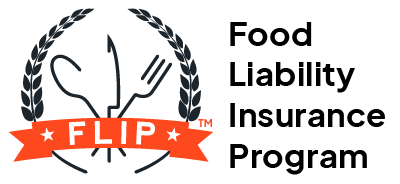Last Updated: 12/20/2023
As a food vendor, caterer, private chef, food truck owner, or any other type of food professional, you probably get a lot of questions every day. “How much is this?” “Do you have condiments?” “Can I get this without onions?” “Where are the bathrooms?” These are just a few of the questions you have probably been asked at some time while you are selling your food.
There is one question, however, that is extremely important that you be able to answer every single time. The customer will usually say something like this: “I am allergic to peanuts. Do you serve your food with peanuts?”
The specific allergy may differ from customer to customer. But this is probably the most important question you will hear as a food professional because getting the answer wrong can cause serious harm.
Keep reading to learn more about why food allergy awareness is so important for your food business and what steps you can take to ensure all of your customers can safely enjoy your food without risking a reaction.

The Truth About Food Allergies
The Asthma and Allergy Foundation of America estimates that roughly 20 million Americans have food allergies, and every three minutes someone in the US is sent to the emergency room for a food allergy. Those are some scary food allergy statistics, but it’s important to be aware of them so that you can take steps towards preventing this from happening to one of your customers.
Here’s another statistic that can help you: eight foods account for 90% of food allergies. These foods are milk, eggs, peanuts, tree nuts, soy, wheat, fish, and shellfish.
This is important information because if you cook with or serve these foods, you need to know which of your menu items contain these ingredients (even in trace amounts). You’ll then be able to answer customers honestly and confidently when they ask if a certain dish contains something they’re allergic to
Steps to Ensure Food Allergy Safety in Your Food Business
1. Require Food Allergy Awareness Training
One of the first steps you should take to avoid causing an allergic reaction in one of your customers is to make sure you and your employees have undergone food safety training.
Depending on where your business is located, your state or local government may require anyone who handles food to take a special course in food safety to obtain a certification (usually referred to as a food handlers permit). Be sure to familiarize yourself with the food handler requirements in your state.
Even if your state doesn’t require training food handlers in allergy awareness, it’s a good idea to require your employees to get their food handlers permit because they’ll be trained on how to avoid cross-contact. Similar to cross-contamination, cross-contact refers to an allergen being accidentally transferred to a food that does not contain that allergen.
A food safety course will cover ways to prepare your workspace and safely handle foods with and without allergens, such as:
- Cleaning all of your cooking utensils and work surfaces with soap and hot water
- Keeping your work clothing clean
- Washing hands thoroughly and frequently
- Preventing anyone who is working with ingredients that contain allergens from being in the vicinity of allergen-free meals
- Taking care not to use the same serving utensils between allergen-free foods and foods that contain allergens
Even the smallest traces of an allergen on a utensil can cause a customer to have a serious reaction. Some people have such severe allergies that they cannot even be at the same table as food containing that allergen. By educating yourself and your staff on cross-contact and how to avoid it, you can prevent emergencies like these that would require serious medical attention.
2. Include Food Allergy Disclaimers
One of the best ways to avoid a customer suffering an allergic reaction from something you served them is to be upfront with them from the start about which menu items contain allergens.
This is best accomplished by adding a disclaimer next to these items on your menu. Something as simple as adding bolded, easy-to-read text next to the name of the item that reads “This item contains peanuts” or “This item contains trace amounts of shellfish” can be extremely beneficial.
Adding disclaimers like these will allow your customers to make educated decisions about which items they shouldn’t order because they contain ingredients they’re allergic to. Alternatively, they might see that an item is made with an allergen and be able to ask if it’s possible for you to prepare it without that allergen. Either way, this small change can have a big impact on keeping your customers safe, which will also build trust with them.
3. Don’t Serve Food to Unattended Minors
Did you know that the Centers for Disease Control and Prevention (CDC) estimates that 1 in every 13 children in the US has a food allergy? While some children might be very good about avoiding foods they’re allergic to, it’s not a good idea to assume that all of them are—particularly very young children.
While you probably won’t have a lot of young children purchasing food from you without their parents nearby, you should refrain from taking their order or be mindful of any free samples you leave out.
For example, if you have a bowl of candy that contains traces of peanuts next to your register and a child with a peanut allergy grabs one, eats it, and has a reaction, you could be held responsible and be forced to pay for any resulting medical bills.
4. Protect Your Business With Liability Insurance
Even when you take all the necessary precautions with food allergens, accidents can still happen. You may inadvertently use an ingredient that was processed in a facility with tree nuts, or a spatula that came into contact with peanut oil from your frying vat. Or, like in the case above, a child might eat something without asking if it contains allergens first.
Incidents like these can cause a serious allergic reaction in one of your customers, which might require them to go to the emergency room and receive immediate medical attention. They could hold you financially responsible for any medical bills or damages that occur because of this. One of these claims could cost your business thousands of dollars.
To protect your business from expensive food allergy claims, you need food liability insurance. Starting from just $25.92 per month, Food Liability Insurance Program (FLIP) offers comprehensive coverage for food businesses that can shield you from the cost of allergy-related claims, in addition to others, like:
- A customer contracting a foodborne illness from something you served them and suing you
- Someone tripping over one of the cords to your cooking equipment and suing you for their resulting injuries
- The oil from your deep fryer making a large stain on the wall of the commercial kitchen you rent and the kitchen owner holding you responsible to pay for repairs
FLIP also makes it easy to customize your policy with additional coverages, such as tools and equipment, trailer endorsement, cyber liability, and more. You can purchase your policy in ten minutes or less with our convenient online checkout process. No need to leave your home or even speak to an agent!
Safeguard your business from costly claims with food liability insurance from FLIP and enjoy the peace of mind that comes with knowing you’re insured.

Be Aware and Take Care
Food allergies are scary to think about, but now that you know how common they are and what you can do to keep your customers and your business safe, you’re in a good position to take the necessary steps to prevent allergy-related emergencies. The next time a customer asks you if something on your menu contains a certain allergen, you’ll be more than prepared to answer!

By Alex Hastings
Alex is a Marketing Copywriter at Food Liability Insurance Program (FLIP). In her free time, she enjoys reading, birding, traveling, and finding any excuse to get brunch.

